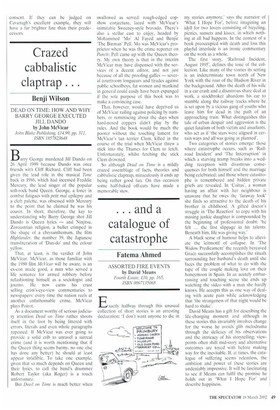. . and a catalogue of catastrophe
Fatema Ahmed
ASSORTED FIRE EVENTS by David Means Fourth Estate, £10, pp. 165, ISBN 0007135068 Exactly halfway through this unusual collection of short stories is an arresting declaration: 'I don't want anyone to die in my stories anymore,' says the narrator of 'What I Hope For', before imagining an idyll for two lovers consisting of bicycling, picnics, sunsets and kisses, in which nothing at all bad happens. In the context of a book preoccupied with death and loss this playful interlude is an ironic commentary on the work as a whole.
The first story, 'Railroad Incident, August 1995', defines the tone of the collection. Like many of the stories its setting is an indeterminate town north of New York with the roar of the Hudson River in the background. After the death of his wife in a car crash and a disastrous share deal at work, a stockbroker abandons his car to stumble along the railway tracks where he is set upon by a vicious gang of youths who leave him for dead in the path of an approaching train. What distinguishes this tale of urban despair and aggression is the quiet fatalism of both victim and assailants, who act as if 'the stars were aligned in certain ways and all was going as planned'.
Two categories of stories emerge: those where catastrophe occurs, such as `Railroad Incident' and 'The Interruption' in which a starving tramp breaks into a wedding reception with disastrous consequences for both himself and the marriage being celebrated; and those where catastrophe is remembered and hidden private griefs are revealed. In 'Coitus', a woman having an affair with her neighbour is unaware that he owes the 'faraway look' she finds so attractive to the death of his brother in childhood. A gifted doctor's struggle in 'The Reaction' to cope with his missing junkie daughter is compounded by the beginning of professional doubt: 'he felt ... the first slippage in his talents. Beneath him, life was giving way.'
A black sense of humour helps to alleviate the leitmotif of collapse. In 'The Widow Predicament' the recently bereaved Grace successfully accomplishes the rituals surrounding her husband's death until she faces the problem of what to do with the tape of the couple making love on their honeymoon in Spain. In an acutely embarrassing and touching scene she ends up watching the video with a man she hardly knows. He accepts this as one way of dealing with acute pain while acknowledging that 'the strangeness of that night would be hard to shake'.
David Means has a gift for describing the life-changing moment and although in these stories this invariably involves change for the worse he avoids glib melodrama through the delicacy of his observations and the intricacy of his storytelling; viewpoints often shift mid-story and alternative outcomes are toyed with before making way for the inevitable. If, at times, the catalogue of suffering seems relentless, the ambition and power of these stories are undeniably impressive. It will be fascinating to see if Means can fulfil the promise he holds out in 'What I Hope For' and describe happiness.
















































































 Previous page
Previous page